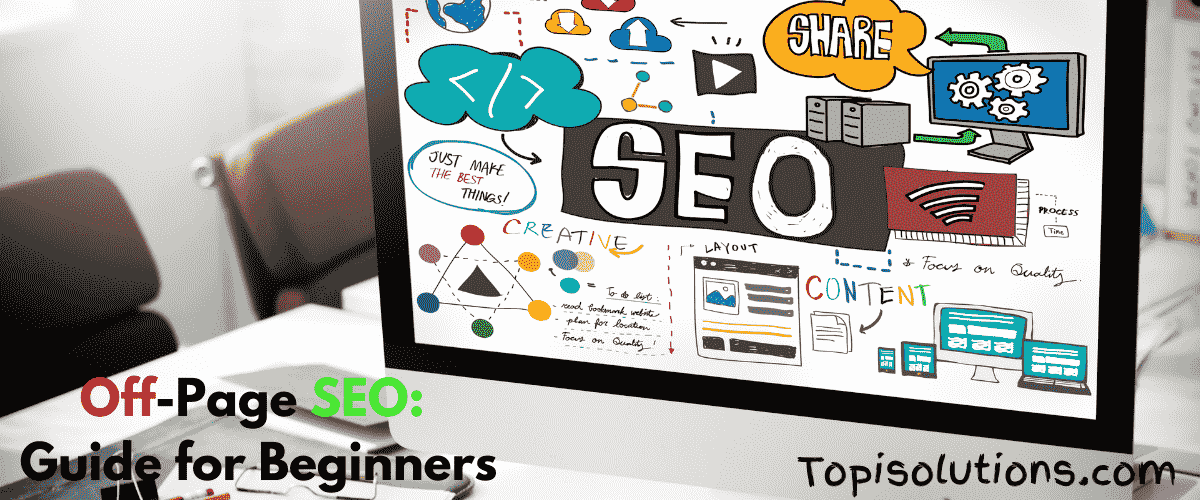- 1 Introduction
- 2 1. What Is SEO Off-page: Off-Page SEO: Guide for Beginners?
- 3 2. The Importance of Off-Page SEO:Off-Page SEO: Guide for Beginners?
- 4 3. Key Components of Off-Page SEO:Off-Page SEO: Guide for Beginners?
- 5 Social Media Engagement:Off-Page SEO: Guide for Beginners
- 6 Brand Mentions:Off-Page SEO: Guide for Beginners
- 7 Guest Blogging:
- 8 Influencer Marketing:
- 9 Forum Participation:
- 10 Directory Submissions:
- 11 4. Some Useful Off-Page SEO Techniques:
- 12 Content Marketing:
- 13 Influencer Outreach:
- 14 Broken Link Building:
- 15 5. Measuring Off-Page SEO Success
- 16 Conclusion:
Introduction
Off-Page SEO: Guide for Beginners
Off-Page SEO (Search Engine Optimization) refers to all the activities you perform outside your website to improve its ranking
on search engine results pages (SERPs). While on-page SEO focuses on optimizing elements within your website, such as content
And HTML code, off-page SEO is about building your website’s reputation and authority through various external factors.
This guide will help beginners understand the fundamentals of off-page SEO
and how to effectively implement it to boost their site’s visibility and ranking.

READ ALSO:Understanding On-Page SEO: A Complete Guide for Beginners.
1. What Is SEO Off-page: Off-Page SEO: Guide for Beginners?
Search engines like Google use complex algorithms to determine the relevance and authority of a website.
While on-page SEO tells search engines what your website is about,
off-page SEO signals how authoritative and popular your site is.
These signals include backlinks from other websites, social media mentions, and other forms of online engagement.
A strong off-page SEO strategy can help establish your site as a trustworthy resource,
which can lead to higher rankings, more traffic, and increased credibility.
2. The Importance of Off-Page SEO:Off-Page SEO: Guide for Beginners?
Popular search engines such as Google incorporate complicated formulas in ranking pages to high levels of relevance and acceptability.
While on-page SEO informs the search engines about what your website is all about,
the off-page SEO shows just how legitimate and popular your website is.
Such signals include the number of links from other sites,
the number of mentions in social media platforms and any other form of interaction.
3. Key Components of Off-Page SEO:Off-Page SEO: Guide for Beginners?
Backlinks:
- Quality Over Quantity:Link quality is not something that is static, all the back links are not the same. They also highlighted that it is better to have a few quality back links from other reliable sites rather than having numerous links from low quality sites. Pat yourself on the back if you can have backlinks from other sites that are reputable and in the same niche as you.
- Natural Link Building:This means that backlinks should be original and not fabricated through paying for them or manipulating google. Link building can also be problematic because search engines may punish sites involved in poor link building.
- Anchor Text:When creating hyperlinks, the words, which are underlined and clickable, must correspond to the content to which the hyperlink is set. Using different anchor text can let the search engine know which context the link is in.
Social Media Engagement:Off-Page SEO: Guide for Beginners
- Shareable Content:Sharing interesting content to your followers on the social media platforms can increase traffic to your site and, therefore, its visibility.
- Active Presence:Continuing to appeal to your audience through various social media channels can help expand its presence and subsequently prompt more shares and mentions.
- Social Signals:Social metrics such as the number of likes, shares, or comments also can provide an idea of the popularity of your content and can indirectly affect the ranking.
Brand Mentions:Off-Page SEO: Guide for Beginners
- Unlinked Mentions:Thus, any time people speak your brand’s name even if they do not link to your site, it can add to your site’s credibility. Brand building may lead to more mentions and more people trusting the existence of the concerned brand.
- Reputation Management: To guarantee that your brand is mentioned positively across the social platforms, always keep track of your online reputation. Any negative comments or issues should be dealt with in a polite manner as soon as possible.
Guest Blogging:
- Quality Contributions:Other popular sites also within your industry that you should blog on were also a good way to obtain backlinks and increase the readership.
- Authentic Outreach: It is advised to avoid tackling other bloggers and site owners for guest posting multiple times rather one should work towards being friends with them.
Influencer Marketing:
- Partnership and collaboration : by partnering with industry influencers to help extend your content reach while driving high quality backlinks resources.
- Influence : Choose the right influencers that align with your brand values to make a more effective effort regarding content authenticity.
Forum Participation:
- Niche Relevant Forums: Join forums and online communities related to your industry, where you can be active and casual share the contents you have generated.
- Content quality: Give more than you take – focus on adding value, not just backlinking to your site
Directory Submissions:
- Directories -quality: directories are an efficient way to boost your online visibility by easily submitting your websites, so go for good online directories.
- Local SEO: Be sure your business is listed in directories to help with local SEO efforts.
4. Some Useful Off-Page SEO Techniques:
Content Marketing:
- Give High Quality: Release articles, videos or any content that can inform the audience and is shareable in nature. This includes blog posts, infographics, videos or podcasts.
- Distribution: Promote your content through different means, Social Media (You can set up automated sharing with Buffer ), Email Newsletters( To notify subscribers of new posts) and submitting in Industry forums for more reach and possibility of being linked back to.
Influencer Outreach:
- Find Key Influencers: Research and identify influencers in your field who have a large fan base that will assist you with promoting content.
This includes social media, email and events to build real relationships with influencers. Work on content and projects that help both sides.
Broken Link Building:
- Find Broken Links: Tools to help you hunt for broken links throughout your industry’s top sites.
Local SEO and Citations
- Google My Business:The first thing you need to do is create or claim your Google My Business listing (you can read the guide here) but that’s just a start.
Local directories: make certain that your business shows up in local directories as well as on online maps.
5. Measuring Off-Page SEO Success
- Backlink Profile: make sure to have a good backlink profile Use tools like Ahrefs or Moz. Then you should see an increase in good backlinks over time.
- Tracking Referral Traffic: Keep a track of referral traffic from the external websites using Google Analytics on your website.
- Social Engagement: Measure shares, likes and comments to understanding how well your social media efforts are engaging.
- Mentions of Brand name: Monitor all over the web so that you can be notified whenever someone mentions your brand.
- Domain Authority: Monitor your site’s domain authority via free tools available on Moz or Ahrefs. More domain authority equates to better off-page SEO.
“For a collection of inspiring and meaningful Islamic quotes, visit noorey567 on Islamic Finder.”
Conclusion:
Off-page is one of the most vital segments of the overall SEO approach. By identifying and implementing such SEO strategies as backlinks, social media, and reputation management, the site can improve its authority and positioning. Off-page SEO is a long-lasting process that needs constant actions and engagement in real accounts. Using the aforementioned strategies in this guide will assist one in achieving a solid online presence and obtaining higher ranking on SERPs.

